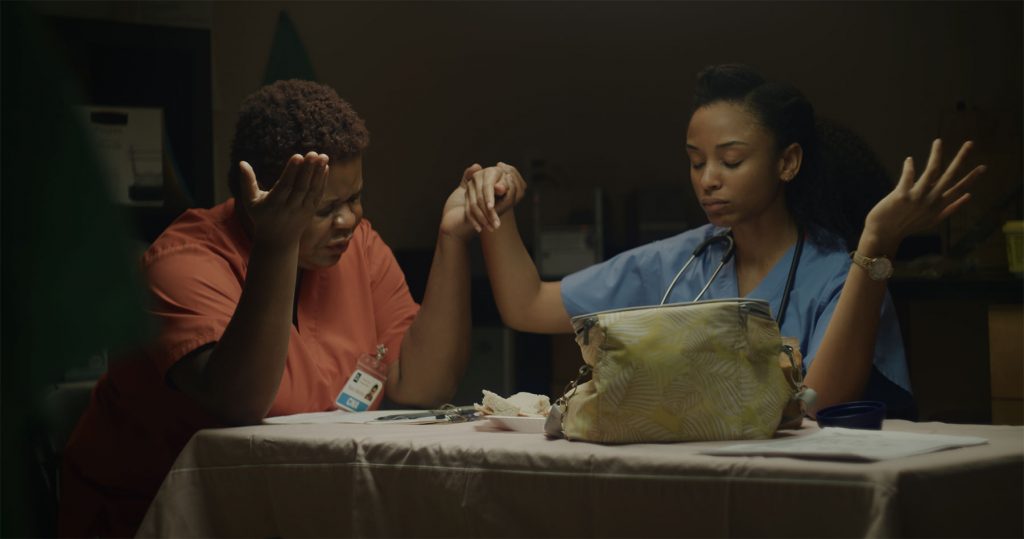Ludi follows a woman plagued by work in search for her self-worth, keeping true to its themes but grappling with the right story to go with it.
In the United States, there is a commonly seen effort at working hard to have a better life, and this applies most especially to the immigrants who move there in search of that. But working hard at your occupation won’t always equal having a better life. As a character in this film gently puts it, “the American Dream isn’t what it used to be.” Our protagonist, Haitian immigrant Ludi Alcidor (Shein Mompremier) is part of that cycle, chasing at every opportunity to earn as much as possible to give her family a better life. Her character is the embodiment of the American Dream, and the heart of this small indie drama. Director Edson Jean derives the basis of Ludi’s struggle from his mother’s own experience, which provides the blueprint for a story with an important moral. Unfortunately, Ludi’s aspirations are somewhat dwindled by its plot, which doesn’t reach the heights of the powerful message it itches to tell. Yet, with small moments where the story truly feels personal, Ludi still manages to explore how excessive working can jeopardize one’s life. The film’s plot might get sidetracked, but the film’s touching sincerity never does.
Ludi is originally from Haiti, but she lives in the Little Haiti district of Miami, Florida, which makes her feel closer to home. Working as a nurse at a hospital, she endures endless amounts of hours, including an absurd quantity of overtime, to earn enough money to send to her family, back in Haiti. She is fatigued by her job, but she doesn’t stop at anything, most especially after her niece, Fafa, kindly asks for a new dress for graduation. Desperate for the cash and unable to obtain more shifts from co-workers who are on her same boat, Ludi decides to pick up a shift for private care offered by her landlord Blanca (Madelin Marchant). Since that goes against company policy, her decision puts her current job at risk. The patient, George (Alan Myles Heyman) does not prove easy to take care of either, constantly battling against Ludi’s efforts to assist him. Everything that Ludi suffers through soon begins to challenge her self-worth, and she begins to reevaluate all the hard sacrifice she put into finding a better life that never seems to come.
Ludi’s conversations with people (such as bus drivers and co-workers) practically summarize her way of thinking: work comes first. She makes zero time for herself, because of her fixation on helping her loved ones. While this reasoning is not bad per se, it deteriorates Ludi without her knowing it. It is only when she begins to interact with George that she slowly learns she must take it easy, instead of breaking her back trying to put all her focus on work. George himself, at his elderly age, recalls his entire life of ‘working like a horse’ only to end up old and frail, and forgetting to put his wife and kids first, and living the rest of his life in regret. These two characters share the same troubles, which we can all relate too, and help remind us that, while we keep busy, we should never to forget to take a moment now and then to enjoy our lives.

In the film’s unaverage 79 minute runtime, Ludi and George’s scenes together (which take up a majority of that length) are the meaty part of the film. The rest isn’t as fully fleshed out, for the writing fails to fully show the progression of Ludi’s internal struggle. We are introduced to Ludi’s life and empathize with her determination to help her family out, but the situations she comes across prior to her shift with George have no stakes that highlight the significance of the theme. From small things, like getting to work on time despite losing her bus, to having no upfront punishment from breaking company policy, most of the events in the first half of the film only make Ludi feel quite passive in her own story of struggle. Everything solely escalates in the latter half of the film, when she takes care of George. Here, the story finally builds up towards its climax, which contains the biggest blow to our protagonist. And, while the climax may feel a little unearned, it easily shows the consequences of Ludi’s decision to overwork herself. With this, the film’s theme gets its justice.
Ludi’s frustrations are effortlessly portrayed by Shein Mompremier, who gives Ludi a smile that disguises bottled up feelings, and effectively displays her character’s persistence towards impatient patients, and, more importantly, her undying hope for the American Dream. Her performance makes it easy for us to identify with her struggle. Her character glows of sympathy and interest, and both of these things are what the film will depend much upon, due to the lack of a straightforward narrative progression. With Ludi, Edson Jean gives the audience a piece of home with a flawed story that still manages to remind us the importance of putting our own personal lives first before our jobs. It’s a pivotal and universal message that all the Ludis of the world should embrace dearly.
Ludi was the Opening Film of the 38th Miami Film Festival, and premiered at the Silverspot Cinema on Friday, March 5, 2021. The film will be available for virtual viewing on March 6.

